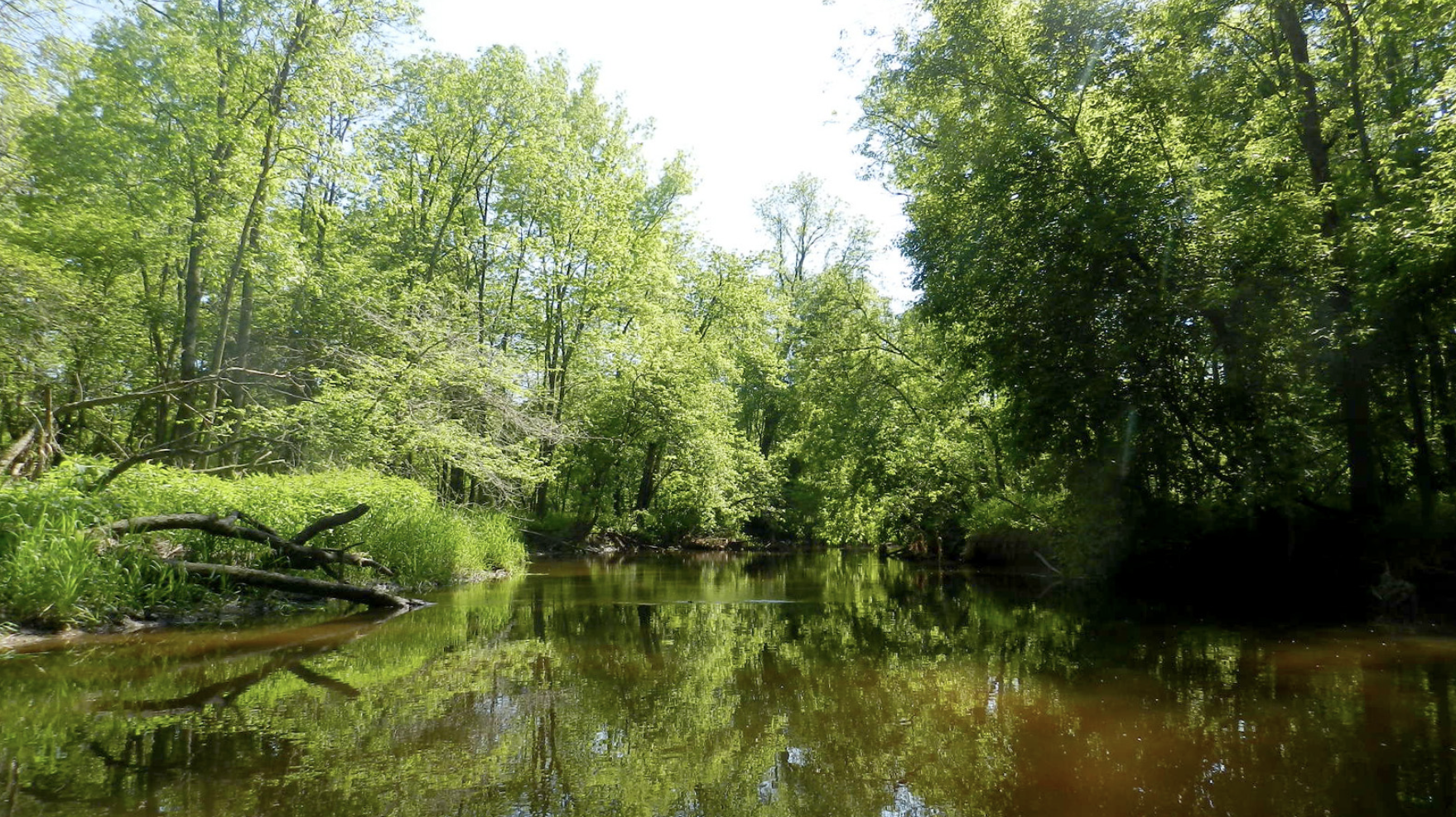
Part of the Rubicon River occupies the land of the new Catholic Ecology Center. (Submitted photo)
Whenever things don’t go according to plan, the Christian remembers that God, in his providence, usually has something greater in the works. But doing so requires a tremendous investment of trust: “greater” by the reckoning of God is not always synonymous with the desires of the human heart.
That crucible of disappointment and trust is where the Laudato Si’ Project found itself in the spring of 2020. Founded in 2016, this Catholic apostolate has a mission to “restore humanity’s connection to the natural world through faith, education, stewardship and recreation” inspired by the papal encyclical “Laudato Si’: On Care for Our Common Home.” In their five years of existence, the group has worked with more than 4,900 youth, families and adults, holding educational programs, logging stewardship hours, hosting faith-based hikes and day retreats, and even helping parishes learn to become more sustainable.
It has long been the organization’s goal to found a Catholic Ecology Center comprising natural space and a physical building that would give a permanent base to its evangelization efforts. So last spring, when plans fell through for the purchase of land that would have provided a home for such a center, Laudato Si’ Project Executive Director Joe Meyer was feeling pretty discouraged.
“It was definitely trying for my trust and faith. I had resigned myself to, ‘OK, God, this is your project, not mine,’” said Meyer. “You trust, but you also know that just because God has something better, ‘better’ doesn’t always mean better how you envisioned it.”
But sometimes, “better” really is worth waiting for. Within just a few months, another property had come across Meyer’s desk that ticked all the boxes — ample existing facilities to host events and retreats, plus 59 acres of natural beauty just 10 minutes away from Holy Hill. When the group toured the property (formerly the Girl Scout Camp Winding River) in November, Meyer knew this was the Catholic Ecology Center’s new home.
“God really blew it out of the water,” said Meyer. “To purchase this property that has an existing building we can begin to run programming out of, that already has a lot of the spaces we need — the infrastructure, the roads, the utilities.”
The Laudato Si’ Project closed on the camp in early March; in total, the property is 225 acres, the remainder of which was purchased by a supporter of the Catholic Ecology Center, Keith Everson, CEO of Sussex IM, who will use the land as corporate and employee retreat space called Camp SIM. The Catholic Ecology Center’s portion of the camp is close to 60 acres and includes a pond, a half mile of creek and two miles of the Rubicon River, more than five miles of hiking and ski trails, a 4600-square foot main building, a 2600-square-foot three-season building, five cabins for overnight groups, a large yurt and campsite spaces.
“All these spaces can be rented by parishes, schools, organizations or families, or as part of a program facilitated by CEC staff,” said Meyer.
The Catholic Ecology Center will also be the new home for Clare Gardens, the organic gardening and education ministry of the Milwaukee Catholic Home. Currently housed in Burlington, Clare Gardens will relocate to the Catholic Ecology Center this year to grow vegetables and orchards, and perennial fruits, as well as host beehives and incorporate composting from food waste generated on site.
Inside the main building is a 1300-square-foot hall that will be christened St. Francis Hall, a loft space called Heaven’s Hideout that will feature hands-on activities for children, and a multi-use space in the lower area that will become the St. Kateri Classroom. Elsewhere on the property is another 2,600-square-foot building that will be called JPII Hall.
Spurred by a $250,000 matching grant from a generous donor, the Catholic Ecology Center is fundraising to remodel and update the existing facilities at the former Camp Winding River and to build a prayer chapel, balcony, entrance way and breakout room; $92,000 of the funds are already raised.
All decor and furnishings will incorporate the group’s strong Catholic identity and its love for the natural world, said Meyer. At the core of the Laudato Si’ Project mission is the philosophy that God’s truths are revealed by him in the perfection of his natural creation — and that creation can be a powerful tool by which humanity is reconciled to the divine.
“We are 100 percent Catholic — this is not eco-spirituality,” said Meyer. “We’re doing this with full love and appreciation for the truth and beauty of the faith, and the teaching authority of the Church.”
Too often, it falls to secular groups or to other Christian denominations to champion care for creation, said Meyer. He wants to see Catholics step into that role as well.
“Within the secular world, people have been really paying attention to matters of ecology and I think that we as Catholics could be such great leaders in that. There are Protestant groups that are doing a lot more with (Pope Francis’ encyclical) Laudato Si’ than we as Catholics are,” he said. “Within Catholicism, I think we can better understand our call to be stewards of the environment.”
A full agenda of events is already planned for the new Catholic Ecology Center, including an Earth Day celebration, a birding hike on Mother’s Day weekend and a live owl program on May 15. Auxiliary Bishop James T. Schuerman will visit the center on Saturday, July 10, for a blessing of the land and a special Mass. For a full listing of events and details, plus information about volunteering, becoming a member and donation, visit https://catholicecologycenter.org/.
